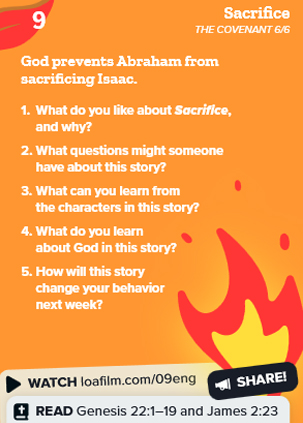Featured Videos
Ep 4: Count the Stars
Abram, a man of faith, is called on a miraculous journey. As he faces doubt and sacrifice, a divine promise ignites his hope.
Ep 6: A Son
Abraham and Sarah receive news of a son, Isaac, from God, despite their old age.
Ep 7: Torn
Abraham’s promise of a son is fulfilled with Isaac’s birth. Joy turns to tension as Ishmael’s jealousy grows.
Ep 8: Unbearable
Abraham’s faith is tested as he prepares to sacrifice Isaac, thus highlighting the challenges of adhering to divine will.
Ep 9 | Sacrifice
Abraham’s faith and obedience earn God’s promise of blessings, a lasting covenant, and a key role in His plan for humanity.
Bible Reference
Related Sources
Related FAQs
Here are some of the most commonly asked questions about this episo
Abraham’s willingness to give up what was most precious shows a deep-rooted trust. He didn’t just believe in God’s promise—he believed in God’s goodness, even if the promise seemed in jeopardy. This level of faith is rare, and the episode invites us to ask: what would we be willing to surrender?
Because Abraham’s obedience proved his commitment. God had already made promises, but this event confirmed that Abraham was truly walking in faith. The reaffirmation is not for God’s benefit, but for Abraham’s and for future generations who would read his story.
Yes. The region of Moriah later becomes the site of Solomon’s Temple. In Christian theology, it’s also linked symbolically to Golgotha, where Jesus was crucified. The place where God provided a ram becomes the place where He later provides His own Son—a profound narrative arc of substitution and redemption.
Though the text doesn’t state it directly, Isaac carries the wood and asks about the lamb. He seems to understand gradually. His silence at the altar suggests trust in both his father and God. Christian tradition often sees him as a willing participant—a figure of quiet obedience, even foreshadowing Christ.
In ancient Mesopotamia and Canaan, child sacrifice was tragically common—often to manipulate gods. Here, God stops the sacrifice. He tests Abraham, but provides an alternative. The message is clear: God is not like other gods. He doesn’t demand death—He gives life through provision.
Muslims commemorate this event during Eid al-Adha, a major festival that involves animal sacrifice and remembrance of obedience to God. The Qur’an emphasizes surrender, and while it doesn’t name the son, most Islamic tradition considers him to be Ishmael.
Because he trusted God in the unseen, and acted before understanding. His journey wasn’t perfect—he doubted, made mistakes—but in the defining moment, he chose obedience over self-protection. That example of trust becomes foundational for Jews, Christians, and Muslims alike.
Adam failed by taking what was forbidden, trusting a deceiver instead of God’s word. Abraham, by contrast, was willing to give up even what was promised—his son—because he trusted God’s voice. Where Adam grasped for autonomy, Abraham surrendered in faith. This contrast reveals a deeper pattern in Scripture: redemption begins where trust is restored.
















